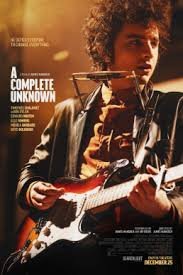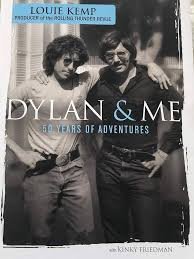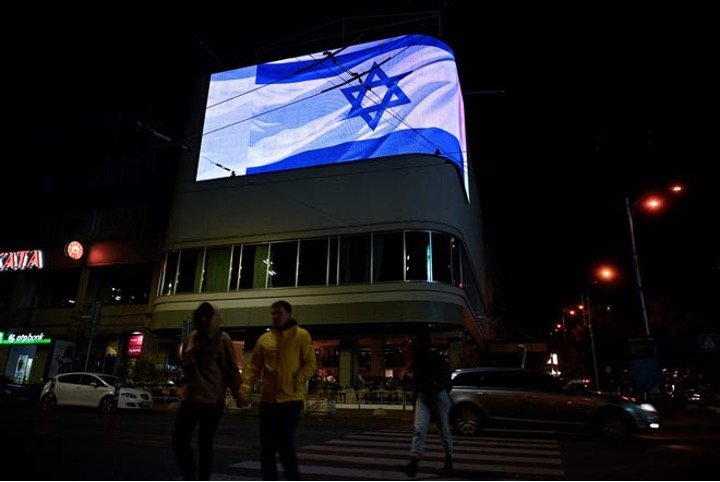We spent Christmas Eve in the traditional Jewish manner: we went to the movies. And there was really only one movie I had any interest in seeing: the new Bob Dylan biopic A Complete Unknown, which tells the story of Dylan’s arrival and departure from the Greenwich Village folk scene from 1961-1965.
There’s a scene at the beginning of the film that reveals a lot in a very understated way. There are three characters in a hospital room in Morris Plains, New Jersey: Woody Guthrie (played by Scoot McNairy), who is dying of Huntington’s disease; his loyal friend Pete Seeger (Edward Norton); and twenty year-old Bob Dylan (Timothee Chalamet).[1] Dylan is singing “Song for Woody” to its namesake, his hero. It was the first great song that Dylan ever wrote.[2] The camera pans to each man’s face, and without a word of dialogue, each shot speaks volumes.
Dylan’s eyes are focused far away, on a land that only he can see, as if he knows that his musical journey will soon travel far beyond the confines of “trad. arr.” music.
Woody, devastated by illness, has a look of awe in his eyes, as if this young acolyte whom he’s just met already has absorbed all of his influence and transcended it; as if the dying legend knows that Dylan will inhabit a space towards which he could only gesture.
And Seeger’s eyes, too, indicate that he can see where this is going. Seeger is a political radical but a cultural conservative, determinedly preserving old forms and styles. His gaze indicates that he intuits that Dylan will take Woody’s legacy to unimagined places—and yet Dylan’s progress will bring no small amount of pain and destruction in its wake, at least for those who refuse to get out of the new road if they can’t lend a hand.
It’s all unspoken and subtle, and my interpretation may be wrong. Still, I liked the movie a lot. The 2:20 running time flies by, and it’s one of those rare films that I wished was longer. But be forewarned: the title of the movie should be a tipoff that there are no astounding revelations about Bob Dylan’s life and art here. If anything, the greatest songwriter in American history remains an enigma, even as the movie explores some important ideas.
In fact, I’m sure the real Bob Dylan wouldn’t have it any other way. No one is a bigger liar about his past than Dylan—and I consider that to be one of the fascinating things about him. Robert Zimmerman famously arrived in Greenwich Village in the early 1960s with a new name and a farcical biography. In retrospect, his stories about hopping freight trains and joining traveling carnivals are so funny and ridiculous that it’s hard to imagine people took him seriously. But part of the folk music scene of the day was so sanctimonious that they took him at his word; after all, you can’t recognize a joke if you don’t have a sense of humor.
To this day, Bob Dylan loves obscuring his background. His memoir Chronicles was published to great fanfare in 2004, and immediately Dylan’s biographers howled about all its distortions, inaccuracies, and outright fictions. Even more to the point, many people pointed out that the book managed to ignore many of the moments that most fans would actually be curious about! (But there sure is a lot about the Oh Mercy! sessions in 1987...!) As ever, Dylan performed a biographical sleight-of-hand and delivered only what he wanted to deliver.
I think there’s integrity in that position. By stubbornly refusing for seven decades to reveal too much about his personal life, Dylan has just as stubbornly made his songs his definitive statement. Just think about how contrarian that is today. When “CELEBRITY” is the primary cultural value in our world—far more than “ART”—then the art simply becomes saleable product. The TikTok revelations of today’s “influencers” who want to tell you all their private thoughts, likes and dislikes, political views, and fashions preempt creating anything in particular. Or, more to the point: THEY have become the product, more than their creations.
This has never been a problem with Bob Dylan. He flees from making his biography the focal point, so much so that even the most dogged biographers can’t really keep track of how many times he’s been married or how many children he has. He is the anti-celebrity in an age when Nothing is Private. And—in a postmodern twist—that attitude has made him one of the most famous performers in the world. Crazy.
So A Complete Unknown is decidedly not history—and I don’t think that mitigates the movie’s success. Much of it is terrific. The key performance at the heart of the film is stellar: Timothee Chalamet is just superb. He looks and sounds just like a youthful Bob Dylan without seeming forced or self-conscious at all.
Other aspects of the movie are less satisfying. Some of the supporting characters are flat and one-dimensional. The weakest part is the romance with Dylan’s first “true love of mine,” Suze Rotolo. Her character is far enough removed from the real Suze that the filmmakers had the courtesy to change her name. (They call her “Sylvie,” which is a nice allusion to the old-world folk scene represented by the Lead Belly song, “Bring Me a Little Water, Silvy.”) The real Suze Rotolo was a sophisticated and worldly denizen of the cultural and civil rights scene in Greenwich Village, but in the film she is basically a jilted lover who spends most of her scenes on the verge of tears.
Joan Baez gets slightly better treatment. She was a star before Dylan and jumpstarted his career when he needed it. Monica Barbaro does a fine job portraying Baez, and again the musical performances are impeccable (although Baez’s music is much less interesting than Dylan’s). Still, the real Joan Baez has much more gravitas than her onscreen character, and in the film she’s largely reduced to being the “other woman” in a love triangle. I imagine that the real Joan isn’t too thrilled with this movie.
The biggest liberties in the film concern elevating Pete Seeger as the full-fledged second protagonist in the story. Again, the performance is fantastic: Ed Norton completely inhabits Seeger’s persona, with its contradictory aspects of Pete’s inherent decency and goodness, passionate love for tradition, and egoless support of artists who deserve recognition alongside his flashes of anger, frustration, and self-doubt. There’s a grain of truth in the way their relationship is presented, but it’s also a convenient ruse for the filmmakers to set up Seeger as Dylan’s foil. He is an emblem of the old-world folk scene that Dylan quickly found stifling, but I sense that Pete didn’t loom as large in Dylan’s life as he does in the film.
II.
What’s missing is Dylan’s Judaism, which, in my viewing, received a nanosecond of screentime. The scene is a house party at Sylvie’s place, where Dylan has been crashing. Someone spots his old Minnesota yearbook and some other memorabilia and says, “His name is Zimmerman?” The scrapbook seems to be open to a few photos of teenage friends at summer camp. Yes: Camp Herzl, where Dylan learned about Judaism and Zionism. It goes by in a flash; I’ll have to freeze the scene when it’s available to stream to see if my suspicions are confirmed. But nothing else in the film alludes to his Jewish identity.
That doesn’t bother me much. At this time in his life, Dylan was obscuring everything about his past.
But in a world where there are scores of Dylan biographies, critical analyses, and annual scholarly seminars, it’s important to note how Dylan’s Jewish identity is constantly shortchanged. Perhaps that’s because so many Dylanologists aren’t Jewish themselves, so they miss that essential feature in his make-up.
That’s why Louie Kemp’s 2019 biography Dylan & Me a is so important. Kemp has the advantage over other Dylan biographers of actually being an intimate friend of the artist. Kemp was a childhood pal and a recurring figure in most of Dylan’s life: he was there for Dylan’s teenage “first public performance” at Camp Herzl, he was a producer on the barnstorming Rolling Thunder Revue, Dylan was best man at Louie’s wedding—and his frozen fish business even catered The Last Waltz! Kemp is also a baal teshuvah who takes his Judaism seriously—and has shared many Jewish moments with Dylan. His book is important because it fills in this dimension of Dylan’s character where every other biography falls short. (Louie Kemp made Aliyah in the summer of 2024 in a show of solidarity while Jewish people were under attack. When asked if he has family in Israel, Kemp answered, “I have 7 million family members in Israel.” Kemp is a mensch.)
III.
The essential conflict at the heart of A Complete Unknown is centered on that lefty cultural and political scene of the early ‘60s, indeed a portentous moment in U.S. history. There’s no wonder that a young Dylan was drawn there. He was in love with songs, the “Old, Weird America” that murmured beneath the surface of “official” post-War history, as recorded by hillbilly and blues performers. Dylan was already a walking encyclopedia of that secret history.
But the folk scene was also stifling. One thing that comes through loud and clear in Chronicles is how nauseating Dylan finds the idea of being called the “voice of a generation.” He devotes significant space to saying, essentially, who the hell would want to be the “voice” of anyone’s generation?! He has an ornery streak—a need to do the opposite of people’s expectations—which I’ve written about elsewhere and which I personally find appealing.
In the movie, we see how the folkies’ embrace starts with warmth but soon becomes suffocating. “Blowing in the Wind” is a revelation when Suze/Sylvie first hears it. But soon everyone was solemnly intoning it like scripture, especially the humorless Peter, Paul and Mary who drove it to the top of the charts. So the expectation was that he would continue to rewrite such anthems for pious liberals, as they nodded and stroked their goatees.
But Dylan always was more than that. At one point in the film, he warms to a TV appearance of Little Richard, his teenage favorite, before the Seeger-character shuts it off, as if rock and roll was beneath them. (The fact that Little Richard and Chuck Berry were African-American, and that early rock was as Black as folk music, raises interesting questions whether or not the folkies, for all their activism, were really more racially enlightened than other music scenes in the 60s.) The Beatles don’t appear in the movie at all, but in real life, hearing “I Want to Hold Your Hand” for the first time was, for Dylan, a revelation opening up entire realms. Rock was open-ended, anarchic, and filled with possibilities; folk was orthodox and governed by rules and hierarchies.
The film’s climax is the Newport Folk Festival of 1965, where Dylan showed up with the Paul Butterfield Blues Band behind him, a mixed-race electric group with the great Jewish guitarist Mike Bloomfield playing icepick leads. The conservative curators of the festival freaked. So did many fans. (The film conflates the events of Newport with the drama in Manchester, UK from the following year, where an outraged folkie yelled “Judas!” at Dylan, the Jew on the stage.) In real life, after Dylan’s scorching three songs, a desperate Peter Yarrow returned to the stage, coaxing “Bobby” back out, “This time with an acoustic guitar.”
What A Complete Unknown is really about is: the fight for an artist to be true to himself, and to prevail over the stifling orthodoxies where “everybody wants you to be just like them.” That is much easier said than done. We’d still be talking about Bob Dylan today even if he never left the rarified air of the folk scene—I mean, he’d be immortal for “A Hard Rain’s A-Gonna Fall” alone. But we wouldn’t be talking about a once-in-a-lifetime artist who upset established pieties and pushed boundaries. Instead, he’d be remembered as one who stayed in his lane and wrote anthems of validation for people who were already believers.
IV.
So, Chanukah. Does the timing of the movie’s release shed any light on Chanukah this year? I think it does.
“Civilization looked at Jewish difference and said, “Really, how is it that you are still here?””
Chanukah celebrates the world’s oldest fight for religious freedom. The Maccabees fought against the anti-Jewish edicts of Antiochus IV and his regime. But the bigger backdrop of the Chanukah story is the world of Hellenization. Greek clothes, Greek philosophy, the gymnasium, the celebration of the human body… this was the cultural zeitgeist of the era. Greek civilization was seductive for everyone, including the people of Judea.
The first meaning of the Chanukah battle is: the right to be a Jew in the face of overwhelming opposition—against political persecution, sure; but also against a raging cultural tide that mocks our values. In the Maccabees’ time—quite like today—civilization looked at Jewish difference and said, “Really, how is it that you are still here?”
Sometimes that opposition was expressed as oppression. Sometimes it was expressed with excessive love. (Yes, there are those out there who will love you to death. Just ask Bob Dylan.)
At the heart of freedom is the freedom to be different, to go against the grain. Freedom includes the assumption that the majority is not always, or even often, right.
That may sound platitudinous. I don’t mean to say that all forms of cultural assimilation are wrong. Obviously there are elements of secular society that we accept into our lives. After the Chanukah revolution, Jews became free to experiment with Hellenism, to figure out for themselves what aspects of assimilation made their cultural identity stronger, versus those aspects that merely diluted their Jewishness away. (After his electric revolution, Bob Dylan would return to folk music forms throughout his career—but on his own terms.)
That ancient challenge recurs in every generation. That is the Chanukah battle yet to be won.
Especially in the past year, Jews have felt this tension. Everywhere since Oct. 7—in the press, in social media, and especially on America’s disgraced college campuses—we have slanders thrown in our faces. “We’re not antisemitic,” the world keeps telling us, “we just hate Zionism”—as if the impulse for peoplehood and building up our homeland were somehow separate from authentic Judaism. And we’ve spent an enormous amount of capital trying to defend ourselves, explain our positions, build bridges.
Perhaps it is time for Jews—especially young Jews—to realize that there is something fundamentally countercultural about Judaism. For all our efforts to explain our story, and Israel’s, more cogently and directly, for all our efforts to conform and adapt and build coalitions, we should recognize the places where we embrace “the dignity of difference” (in Rabbi Jonathan Sacks’s phrase). Being true to one’s self and one’s people can be challenging and occasionally painful. Periodically someone may howl “Judas!”—or worse—in your face on your way across the quad.
But in the end, the Chanukah struggle for integrity—to “know my song well before I start singing”—is worth every tear. Just ask Bob Dylan.
Forwarded to you? You can sign up to receive these blog posts and updates from me at this link.
[1] The scene is a fiction. Of course Dylan famously did visit Woody’s bedside and sing Guthrie’s songs to him, but there is no indication that these three men were ever there alone together.
[2] More precisely, “Song to Woody” is the first great lyric that Dylan set to music; the melody is Guthrie’s “1913 Massacre.”











